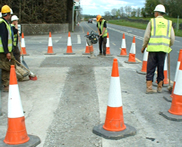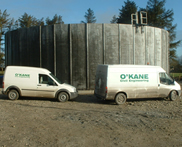Our Services
O’Kane Civil Engineering offers a wide range of services from large water treatment reservoirs to small water meter boxes. We offer single service delivery and tailored integrated solutions to meet precise customer needs.
Check out our unique range of capabilities in detail by visiting the online project examples on this website.
Watermain Network Improvement
We undertake both large and small Engineering projects to ensure that existing watermain networks last longer and that water is supplied efficiently. Watermain Network Improvements are necessary due to new housing and developments putting increasing pressure on older systems, along with the fact that people are using more water. The benefits of improving water networks are less service disruptions due to fewer leaks and bursts, and water will flow more efficiently better serving future demand.
Construction of new Group Water Schemes
Group Water Schemes are found primarily in rural areas generally not served by a public water supply, and are privately owned, operated, and maintained. There are approximately 325 such Schemes in operation in County Mayo alone. Construction of a group scheme involves the laying of new watermains and associated works such as installation of valves, hydrants, consumer water connections, pump houses and a new water storage reservoir and water treatment facility.
Installation of Water Consumer Meterboxes
The installation of meter boxes to facilitate further domestic and non domestic metering by councils or group schemes.The meter box will be installed outside the property boundary, in grass margins or footpaths where possible. In certain instances it will be necessary to install the meter internally. This will be discussed and agreed in advance with the customer.
Domestic and Commercial Water Metering
This work involves the installation of water meters for councils or group water schemes so that water customers throughout the country will benefit from a new means of paying their water charges. Non domestic (commercial, agricultural, industrial or institutional) customers are to be billed for water on a metered basis, which will ensure they will only pay for what they use.
Water Storage Reservoirs and associated works
Changes in weather cause the natural flow of streams and rivers to vary greatly with time. Periods of excess flows and valley flooding may alternate with low flows or dry spells. The role of water-storage reservoirs, therefore, is to impound water during periods of higher flows, thus preventing flooding, and then permit gradual release of water during periods of lower flows.
Water Storage Reservoirs are necessary in a water network system therefore to ensure that customers have an uninterrupted and efficient water supply.
Water Conservation Projects
Water conservationrefers to reducing the use of water. The goals of water conservation efforts include:
- Sustainability - To ensure availability for future generations, the withdrawal of fresh water from an ecosystem should not exceed its natural replacement rate.
- Energy conservation - Water pumping, delivery, and wastewater treatment facilities consume a significant amount of energy.
- Habitat conservation - Minimizing human water use helps to preserve fresh water habitats for local wildlife and migrating waterfowl, as well as reducing the need to build new reservoirs and other water diversion infrastructure.
- Water Conservation Projects involve a combination of metering watermains and connections to identify areas where water is being wasted, replacing leaking valves and fittings, in some cases replacing sections of old pipelines that are leaking to try and make existing networks as efficient as possible.
Watermain Valve Replacements
This work involves replacing existing gate valves, hydrants, air valves, pressure reducing valves, bulk meters, surge anticipating valves for Group Water Schemes or Councils.
Construction of Water Booster Pumping Stations
The primary consideration in the design of Booster Pump Stations (BPSs) is that the quality of pumped water be maintained and that the operation of the BPSs do not cause water quality problems elsewhere in the water system. This includes the requirement to ensure that pressures in the water distribution mains comply with the requirements.
The type of pumping system specified by the consultant engineer will depend on factors such as location, terrain, service area size, flowrate required, costs, difficulty of operation, and reliability of the power supply.

